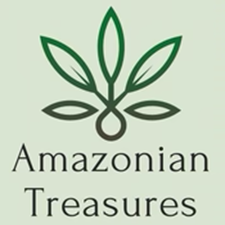Our Natural Materials
Each piece of jewelry begins with the gifts of the rainforest. Our seeds, fibers, and woods are more than just materials; they are the essence of the Amazon, hand-harvested by Indigenous and riverside communities who have nurtured these natural wonders for generations.

|
Açaí is not only a staple food for Amazonian communities but also symbolizes vitality and sustenance. The seeds, repurposed into jewelry, carry the energy of the rainforest, representing renewal and the life cycle. For the Amazonian people, wearing açaí seeds signifies a connection to nature’s abundance and the nourishing spirit of the land. |

|
Jarina known as ‘vegetable ivory,’ jarina seeds are considered a sacred gift from the forest. To the Amazonian communities, these seeds represent purity, sustainability, and protection of the natural world. Used in adornments, jarina connects the wearer to the spirit of the forest, offering a sustainable alternative to animal ivory with deep ecological meaning. |

|
Morototó tree is lightweight yet strong, symbolizing balance and adaptability in the Amazonian ecosystem. For Indigenous communities, morototó wood is crafted into tools and jewelry, signifying harmony between humans and nature. It serves as a reminder of the respect and care the Amazonian people have for their environment. |

|
Tucum fiber and seeds, harvested from the tough, resilient palm, holds deep cultural significance for the Indigenous peoples of the Amazon. It is traditionally used in making hammocks, baskets, and jewelry, symbolizing strength and survival. To the Amazonian people, tucum fiber represents unity and endurance, woven into everyday life and sacred rituals. |
|
|
Saboneteira tree, named after the soap-like texture of its seeds, is valued for its smooth, fine wood. For the Amazonian people, it symbolizes purification and cleansing, often used in sacred rituals. Its sustainable use in jewelry honors the forest’s gifts and the deep spiritual connection between the people and the land. |
|
|
Coconut palms provide much more than food to Amazonian communities; they represent resourcefulness and sustainability. Coconut fiber is used in crafting textiles, baskets, and jewelry, symbolizing the harmonious use of nature’s resources without causing harm. |
 |
Jatobá tree, often called the ‘tree of life’ by Amazonian tribes, is revered for its medicinal properties and durable wood. To the Indigenous communities, jatobá wood represents strength, resilience, and protection. |
 |
Piassava fiber is traditionally used by Amazonian communities to craft brooms, ropes, and baskets, symbolizing resilience and resourcefulness. For the Amazonian people, it embodies the idea of transforming nature’s raw materials into essential tools and beautiful crafts, demonstrating their deep respect for the forest’s gifts. |
/s.glbimg.com/jo/g1/f/original/2013/10/01/jalapao_ass._capim_dourado_-_foto_divulgacao_-_atn_3.jpg) |
Golden Grass is a rare and stunning plant found in the pristine Jalapão region of Brazil. Known for its vibrant golden hue, this unique material is not dyed, but naturally radiant, making it a symbol of beauty and sustainability. Harvested by local artisans, golden grass is carefully woven into exquisite pieces of jewelry, blending traditional craftsmanship with eco-conscious materials. |
|
The Paxiubão and Paxiubinha are distinct palm trees native to the heart of the Amazon Rainforest, known for their resilience, unique qualities, and the fascinating "walking palm" phenomenon. The Paxiubão, with its larger size and robust appearance, and the smaller Paxiubinha, both produce seeds that are highly valued by local artisans for their natural elegance and cultural significance. These palms are renowned for their ability to "walk" due to their stilt-like roots, which allow them to gradually shift their position toward better light and soil. |


